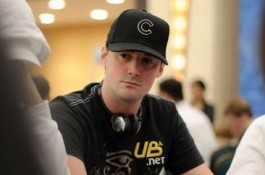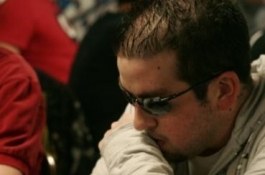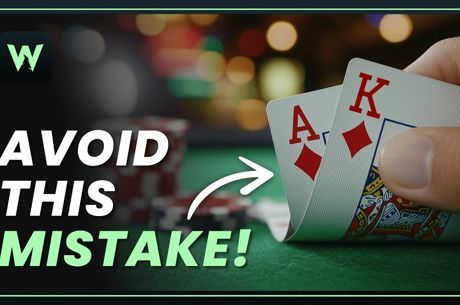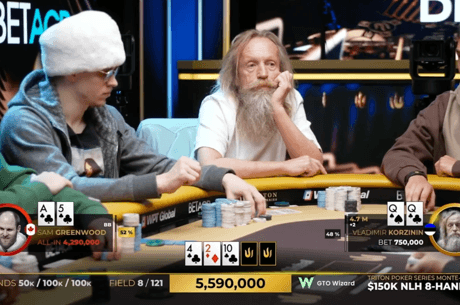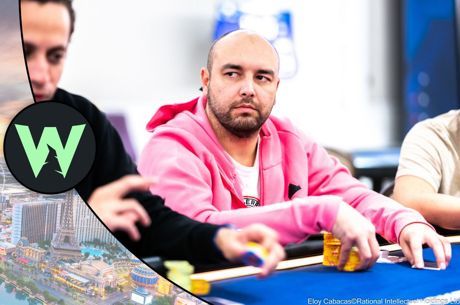Keeping Your Range Open With Ryan D’Angelo, Part 1

Ryan D’Angelo has been making quite the mark in live tournaments this year, after having crushed the online games for the past two years. The 24-year-old made the final table of the PokerStars.net Caribbean Adventure and also owns two World Championship of Online Poker titles, bringing his winnings to almost $1.5 million.
Most recently, D’Angelo went deep at the North American Poker Tour Mohegan Sun Main Event, and looking back on Day 2, D’Angelo recognized two key hands which highlight this week’s concept: keeping your range open in tournaments.
Hand #1
Opponent: Jamie “pokerjamers” Armstrong – 110,000 in chips
Blinds: 1,000-2,000 with a 200 ante
What was your image at the table, previous to this hand?
I came to the table a few hours earlier and quickly won a big pot where I called an under-the-gun raise in late position with ace-ten suited. The big blind called and the flop brought jack-seven-three, with one spade. I float the under-the-gun’s continuation bet, and then he check calls an ace turn. After a blank river, I show ace-ten and win. At this point, I think have 200,000 in chips. I think a bunch of people knew who I was, and I kind of just got the table captain roll right away. I made a comment to him [Jamie Armstrong] right before the previous break that I would never win a pot off him in my life because he owns me online.
Oh interesting. In tournaments?
Yeah, I don’t know. Some people just hold over you in tournaments. For me it’s “SCtrojans,” him, and “puffinmypurp.” So we had the history from online. He probably sees me as pretty crazy and capable of bluffs, but smart.
Hand: Armstrong raises in middle position to 4,800 and D’Angelo calls in the cutoff with A♦10x. The big blind also calls. The flop comes Q♦J♦5♦. The big blind checked, Armstrong bet 9,000. D’Angelo called, and the big blind folded.
What’s your thinking for just calling on the flop?
The idea here is to keep your range wide to disguise your hand, which is very important when you're playing against good players. I’m just going to flat him in position with so many hands and also, on that flop, he just doesn’t really know where I’m at too well. I could have two diamonds or deuces with a diamond, jack-ten suited, or a hand like I have, A♦10x.
When you are flatting preflop, even though you want to keep your range open, how do you keep your three-betting range open as well? Also, how do you know if the value you are getting by just calling with ace-ten is better than the value you can get by three-betting against a frequent raiser?
When I’m three-betting in that spot, I like to do it with a very polarized range. For example, with a hand like jack-five suited, which has almost no playability post flop, or a hand like ace-king or jacks.
Is that against opponents who are capable of four-betting light?
Correct and if I three-bet a hand like ace-ten, and he calls my three-bet, it’s going to be very hard to play post flop if I flop a pair because I’m usually going to have to go with it and not have the best hand a lot. If I three-bet three-four suited and he calls, I can c-bet and just give up usually, which makes it much easier to play for me. Also, when I am in position, I am much more likely to flat with most of my range including strong hands which disguises my range and allows me to make a re-move if someone in the blinds decides to squeeze, etc.
But, I do think that three-betting is a very important aspect to tournaments, especially when stacks get smaller than 50 big blinds. I don’t think you can be a big winner in tournaments unless you are three-betting frequently in position. You just have to make sure you pick good spots to do it. “Pokerjamers” is not usually a good candidate to three-bet too much because he's very good at seeing through what you're doing and bombing it in if he senses you're weak. It’s better to do it on players who you feel "fear" you a bit or have a lot of respect for your game and don’t really want to tangle.
Hand: The turn is the K♥. The board now reads Q♦J♦5♦K♥. Armstrong checked and D’Angelo checked behind.
Why did you decide to check here?
This is pretty much the gin turn card for me because again, my hand is disguised, and if he has a hand like two pair, he’s not getting away. My reasoning at the time was that I thought there would be a decent chance that he would fire a bluff at almost any river card, and obviously, there aren't too many river cards I’m worried about, so I don’t need to worry about protecting my hand. I thought if I bet the turn, he’d be able to fold with a lot of hands that I could get value from on the river like ace-queen, king-ten, etc. And if the river bricks, and he has two-pair plus, I think I get his stack every time anyway.
Hand: The river is the 6♣. The board now reads Q♦J♦5♦K♥6♣. Armstrong led for about 23,000. D’Angelo raised enough to force Armstrong to put in the rest of his stack to call. Armstrong quickly called. D’Angelo showed ace-ten for a straight to the ace. Armstrong mucked.
What do you think he had?
I’m assuming he had two-pair or a set. Although, I could have been getting a light call from AxK♦, or a hand like that.
Later on this week, D’Angelo will discuss a second hand that also illustrates the concept of keeping your range open. Follow us on for up-to-the-minute news.


